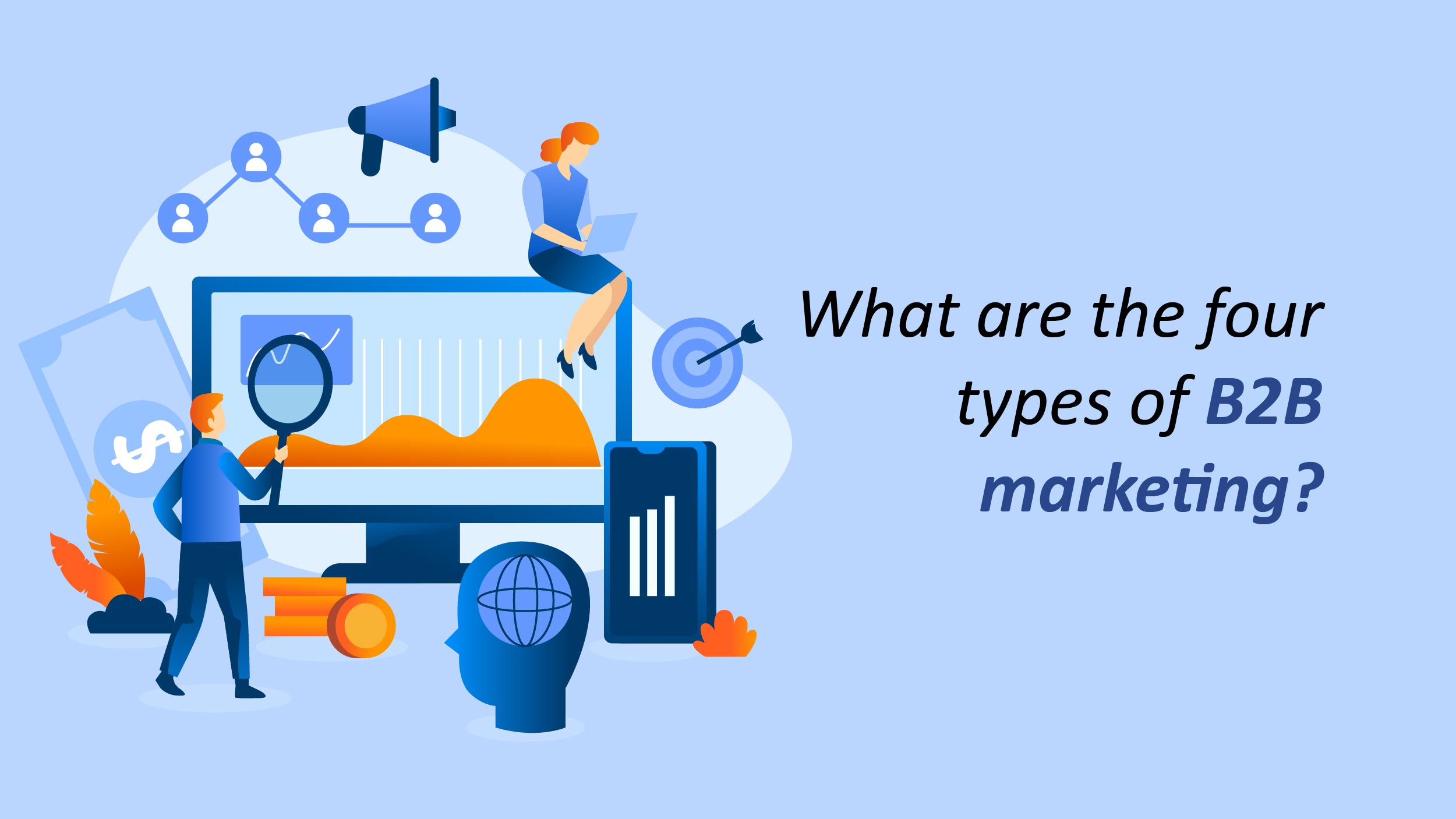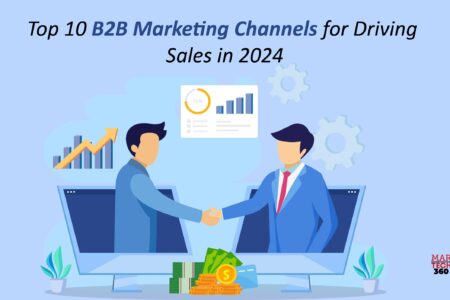The marketing world is rapidly evolving, and businesses are constantly searching for effective B2B marketing channels to reach their target audience. Traditional marketing methods often fail to reach the right people. This leads to wasting money and missing chances due to a lack of personalized marketing plans.
By strategically using online and offline channels, B2B marketing establishes connections between your business and others. This targeted strategy focuses on nurturing leads, building brand awareness, and driving sales. This article discusses the top 10 effective business-to-business (B2B) marketing channels for 2024.
What do B2B Marketing Channels Mean?
B2B marketing channels include traditional methods and digital methods to effectively market a product or service to a target audience. It is crucial to choose the appropriate B2B marketing channel to target potential clients and customers effectively.
Each business-to-business firm is unique, so techniques effective for one might yield different results for another. Thus, there’s no single optimal marketing approach for all B2B companies. The best channel is any repeatable, scalable one delivering profitable returns on marketing investments. To grow revenues profitably, companies must invest in multiple marketing channels at appropriate rates and returns.
It’s crucial to regularly evaluate active marketing channels, ensuring they continue to provide suitable returns. This allows for adjusting campaigns if performance issues arise after testing.
What are the four types of B2B marketing?

What are the Most Effective B2B Marketing Channels for Reaching Target Audiences?
When reaching target audiences in the B2B space, several effective B2B marketing channels are available. These channels vary in effectiveness depending on factors like industry, target audience, and available resources.
Some of the top B2B marketing channels include email marketing, social media marketing, omnichannel Marketing, search engine optimization (SEO), word-of-mouth marketing (WOMM), and much more.
Also Read: 4 Must-Know B2B Marketing Plan Strategy To Effectively Churn Revenue [+New Data]
Top 10 B2B Marketing Channels for Your Business in 2024
Social Media Marketing
84% of top-level execs and vice presidents rely on social media when making buying choices. This highlights social media’s crucial part in swaying high-ranking decision-makers.
These social platforms are mighty digital marketing tools, with colossal user networks worldwide. Over half the world’s population spends over two hours daily on them. Social media allows spreading brand awareness, also directly marketing towards target audiences. There are various ways to market on social media, including posts, sponsored advertisements, sponsored search, interactive content, promotional content, search engine optimization, and many more techniques.
- Tip: Craft engaging content, segment your audience, and leverage paid advertising for maximum impact.
Webinars
Webinars are effective tools for generating and nurturing leads. A significant proportion of B2B marketers—73%—agree that lead nurturing initiatives benefit more from the high-quality leads they obtain during events (48%).
Additionally, webinars have a high conversion rate of 67.05% for communication webinars and higher conversion rates of 67.05% for training and marketing webinars.
B2B organizations can respond to the changes in consumer behavior by hosting virtual events since a large amount of the purchasing process is now done online through content consumption.
- Best Practice: Host webinars at strategic times (Tuesdays for invites, Thursdays for events) and keep them engaging (30–45 minutes with valuable content).
Content Marketing
82% of marketers actively invest in content marketing, according to HubSpot. Blog content can lead to connection points at every stage of the sales funnel or purchasing process.
Providing your audience with both informative and entertaining information at various stages of the sales funnel is known as content marketing. Certain articles, for instance, can be aimed at the top of the funnel, help you establish your brand, and attract prospective clients to your website.
In order to generate leads or close a deal, high-conversion articles might be targeted lower down the funnel or at the end of the buying cycle.
- Key: Develop a documented content strategy, conduct user research, and build a content library to address various needs.
Video Marketing
Video marketing is one of the best B2B marketing channels. LinkedIn is successful with 96% of video marketers finding it effective, while Facebook outperforms YouTube for B2B marketing. These stats underscore the video’s power in reaching B2B customers.
- Remember: tailor video content to different buying stages and leverage platforms strategically for maximum impact.
Email Marketing
Email marketing acts as an interface for information, transactions, and contact between businesses and their customers. Email marketing is communicating with clients via email, both present and potential. Whether the goal is to provide direct service delivery, special promotions, or informative content, every stage of the buying cycle is included. The main goal of email marketing is conversion. It makes potential clients become loyal clients.
- Avoid spam! Personalize emails and provide valuable content tailored to your audience’s needs.
Omnichannel Marketing
- This approach seamlessly integrates multiple channels (email, social media, video) to reach customers.
- Repurpose content across channels for maximum efficiency (e.g., blog posts for social media promotion and podcast topics).
Search Engine Optimization (SEO)
68% of online experiences begin with a search engine. Optimize your website’s content and structure to rank higher in search results for relevant queries. Understand search intent to attract qualified leads at the right stage of the buying journey.
Word-of-Mouth Marketing (WOMM)
WOMM, the oldest form of marketing, leverages positive customer experiences for lead generation. Focus on customer satisfaction to generate organic recommendations. According to a PwC poll conducted in 2023, over 50% of American consumers have told their friends and family about a business they trust.
An increasing number of consumers are turning to word-of-mouth recommendations to guide their purchasing decisions in place of paid content as online content becomes oversaturated and less credible. Marketers now need to gain the trust of consumers by depending on word-of-mouth advertising and customer recommendations. It is important to remember that consumers will only sing the praises of an item or service if they truly like using it.
- Pro Tip: Encourage user-generated content, incentivize customer promotion, and showcase testimonials on your website.
Influencer Marketing
Partner with influencers respected by your target audience to promote your brand. Choose influencers whose values and audience align with your company’s goals. Influencer marketing can significantly impact the bottom of the sales funnel, driving sales quickly.
Offline and Local Advertising
Local marketing leverages non-digital channels like fliers, billboards, and local business partnerships.
- Benefits: Increased trust, a sense of accountability, and targeted reach within a specific geographic area.
Remember:
- The most effective B2B marketing strategies combine multiple channels for a holistic approach.
- Tailor your strategy to your target audience and business goals.
- Track and analyze data to optimize your campaigns for continuous improvement.
By mastering these B2B marketing channels, you can create a winning strategy to reach the right businesses, build lasting relationships, and achieve impressive results.
B2B Marketing Best Practices
To boost B2B marketing impact, apply these practices:
- Audience Segmentation: Tailor initiatives by segmenting your audience by variables like industry, company size, and roles. This custom approach optimizes communication by addressing specific segment needs.
- Continuous Testing: Test strategies repeatedly to determine resonance with your target audience. Conduct A/B tests on ad assets, refine site design, and experiment with email tactics for optimization.
- Sale-Marketing Alignment: Foster collaboration between sales and marketing teams for a cohesive strategy. Shared insights and coordinated efforts enable effective lead nurturing and a conversion boost.
- Marketing Automation: Streamline via automation tools to save time and resources. Automate lead management, email campaigns, and performance analysis for enhanced efficiency.
- Adaptability and Learning: Stay current with industry trends and best practices to remain competitive. Attend events, engage in education, and participate in online communities to adapt strategies.
Final Takeaway
Your marketing and sales teams need to have a deep understanding of your target demographic to produce a return on investment, regardless of the B2B marketing channels or strategies they choose.
Each audience has preferences when it comes to interacting with potential customers. It depends on the industry in question, the psychographics of your audience, and where they are in the buying cycle.
Finally, it’s best to avoid starting off too thin when investing in marketing campaigns. Rather, choose the most promising channel and focus on mastering it before attempting others.

